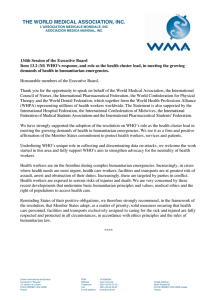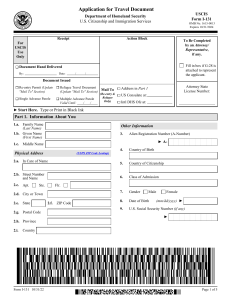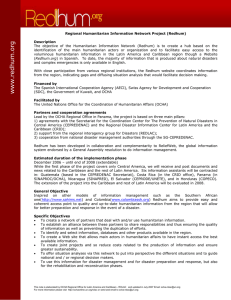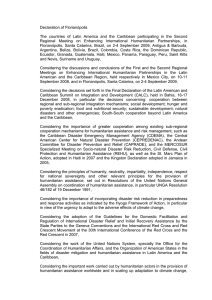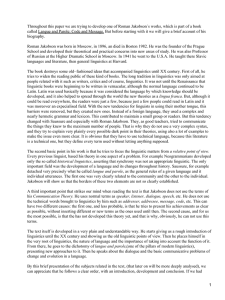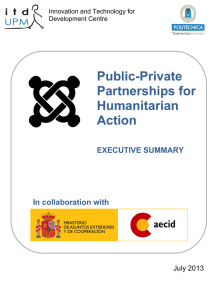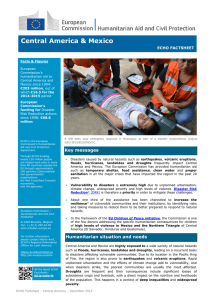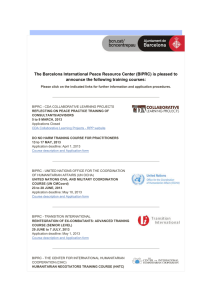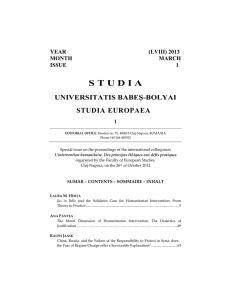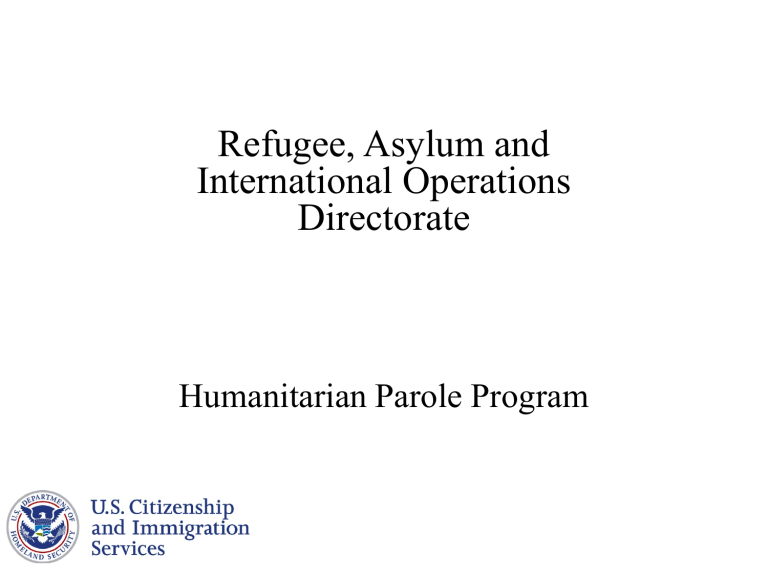
Refugee, Asylum and International Operations Directorate Humanitarian Parole Program Humanitarian Parole The Humanitarian Parole Program is administered by the Humanitarian Affairs Branch Office of International Operations Last updated: February 2011 Humanitarian Parole Overview of Parole Authority Legal Authorities • Parole is governed by numerous Public Laws and national policy, such as: – Section 212(d)(5) of the Immigration and Nationality Act, Title 8, United States Code, Section 1182(d)(5): provides authority to the Attorney General to parole aliens into the United States – Sections 402 and 421 of the Homeland Security Act of 2002, P.L. 107-29: transfers authority for immigration matters, including parole, to the Secretary of DHS; and – Title 8, Code of Federal Regulations, Section 212.5: provides regulations for the parole of aliens into the United States Last updated: February 2011 Humanitarian Parole Legal Authorities (continued) • Parole is a discretionary authority that allows for the temporary entry of individuals into the United States for urgent humanitarian reasons or for significant public benefit • Parole does not constitute an admission into the United States • Parole does not convey any benefits to the beneficiary Last updated: February 2011 Humanitarian Parole What is Humanitarian Parole? • Humanitarian Parole is an extraordinary measure sparingly used to bring an otherwise inadmissible alien into the United States for a temporary period of time due to a compelling emergency. • Humanitarian Parole is not intended to be used to circumvent normal visa issuing procedures, bypass delays in visa issuance, or immigrate to the United States. • It is possible that a parolee can adjust to a permanent status from parolee (e.g., parolees granted asylum, beneficiary of a relative petition, Cubans through the Cuban Adjustment Act, etc.). Last updated: February 2011 Humanitarian Parole Who Can Apply for Humanitarian Parole? • Anyone can make an application on behalf of someone who is outside of the United States and has an urgent need to enter the country. • Individuals may also self petition for Humanitarian Parole if they are outside the United States. Last updated: February 2011 Humanitarian Parole Common Types of Parole Requests • Reasons for Parole include but are not limited to the following: – Medical – Family Reunification (adults and children) – Civil and Criminal Court Proceedings – Other Emergent Requests Last updated: February 2011 Humanitarian Parole HAB staff triages requests for HP received and attempts to provide immediate processing in accordance with the following criteria: • Life threatening medical emergencies • Family reunification • Children under 16 • Physically and/or mentally challenged individuals Last updated: February 2011 Humanitarian Parole Jurisdiction • USCIS, ICE, and CBP exercise concurrent parole authority – USCIS (HAB) authorizes parole for aliens outside the United States for many reasons, including humanitarian. – ICE authorizes parole aliens outside of the United States for many reasons, including law enforcement and intelligence purposes as well as to release detained aliens from custody. – CBP authorizes parole at United States ports of entry, including pre-flight inspection facilities. Last updated: February 2011 Humanitarian Parole Application Forms and Documentation • Form I-131, Application for Travel Document (required for all requests) • Non-refundable of $305 that can not be waived • A concise, to the point but comprehensive statement of facts supporting the parole request • Birth, marriage, or death certificates Last updated: February 2011 Humanitarian Parole Application Forms and Documentation (continued) • Official identification for Beneficiary (e.g., copy of passport) • Proof of immigration status for Petitioner in the United States • Divorce decrees • Guardianship/Adoption decrees • Other pertinent documentation Last updated: February 2011 Humanitarian Parole Application Forms and Documentation (continued) • Form I-134, Affidavit of Support with: – Income tax returns for the previous two years – Proof of current employment – Medical and/or insurance coverage (applicable to medical cases) – Proof of immigration status (if Sponsor is different from Petitioner) – Form I-134 must be signed and dated Last updated: February 2011 Humanitarian Parole Adjudications Decisions • If the parole request is approved, HAB will notify the petitioner and any representative of record. • HAB will then coordinate with the USCIS Overseas Officers or US Embassy or Consulate for issuance of appropriate travel documentation. • If the parole request is denied, HAB will notify the applicant and any representative of record. Last updated: February 2011 Humanitarian Parole Re-Paroles • There is no provision in the regulations to “extend” a parole for an individual who is present in the US. A parole ends on the date the parole period expires or when the alien departs the US if this occurs prior to the expiration of the parole. • HAB has the authority to Re-Parole an alien if the initial parole authorization was issued by the HAB. • A request for Re-Parole requires the filing of a complete parole application package (including a nonrefundable fee of $305) that contains information supporting the need for a Re-Parole. Last updated: February 2011 Humanitarian Parole Conclusion • Over the years, approximately 25% of the received applications have been approved. Generally we receive approximately 1200 applications per year. • Please remember that humanitarian parole cannot be used to circumvent normal immigration procedures and it is not a means to bypass delays in visa issuance. Therefore, humanitarian parole should not be recommended to individuals unless all other avenues for entry into the United States have been exhausted. • Complete application instructions including downloadable forms can be found at www.uscis.gov Last updated: February 2011 Humanitarian Parole QUESTION/ANSWER SESSION ? Last updated: February 2011
